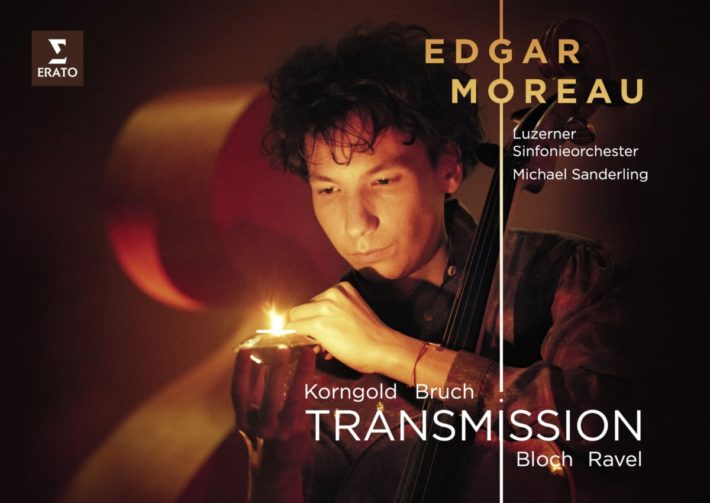Edgar Moreau’s new collaboration with the Luzerner Sinfonieorchester explores different aspects of his close connection to his Jewish heritage through the works of Bloch, Bruch, Ravel, and Korngold. Bloch and Bruch took inspiration from traditional prayer chants. Ravel was born Roman Catholic but had an appreciation for multicultural music including Jewish popular songs and liturgical hymns. Korngold had to flee Austria on account of his faith but eventually found his unique voice as a successful Hollywood film composer.
The performance of Prayer (track 1) from Bloch’s Jewish Life does well to reveal many emotional gradients within its wistful context: the opening theme, for instance, has a poignancy that’s still somehow tinged with contemplation. Moments of sorrow also have hopeful peaks, as in the major section at 1’40”, but its brevity is perhaps what highlights the overarching melancholy. Supplication (track 2) starts out quietly enough but this belies a meteoric surge to its high point. Bloch uses intermittent flashes of major and minor to build intrigue and agitation along the way, and Moreau goes one step further to add nuanced hints of color to these moments. The apex of the work is powerful in its tension: an emotional breakthrough seems imminent, but Moreau holds back just enough for us to hear the gripping plea – but also to wonder if it’s ever answered. The uncertainty we’re left with is, in fact, a perfect embodiment of the title.
Korngold’s Cello Concerto is short but doesn’t for a moment let us overlook its presence. Written for the 1946 film noir Deception starring Bette Davis, it’s eclectic, quirky, and exciting. Even with a variety of compositional textures, what prevails throughout the concerto is how even without the visual, the music itself tells a story. The first section of the Allegro moderato (track 4) borders on being frenetic – in the best of ways – with its acrobatic leaps and crisp staccatos, thanks in part to a well-coordinated xylophone. Moreau handles the virtuosic cello part with a fierce confidence and in doing so, he also sets up a clear distinction in character with the middle section. There is some fine playing here that evokes a sweeping romanticism. The duets between Moreau and strings as well as an expansive G major orchestral theme (1’59”) let our ears bask in Korngold’s lush melodies. The Grave (track 5) takes an initially menacing turn in the orchestral introduction before giving way, perhaps unexpectedly, to a beautiful cello melody. Parts of the movement, including a piercing atonal flute solo, a short but eerie cadenza, and the enigmatic final moments all play a role in fueling the movement’s cinematic suspense.
Related Posts
- Review: Edgar Moreau Plays Offenbach and Gulda Cello Concertos
- Review: Saint-Saëns – Chamber Works – Chamayou, Capuçon, Moreau
- Review: Korngold – Violin Concerto, Sextet – Haveron, Wilson
Bruch’s Koi Nidrei is a well-chosen complement to the extroverted Korngold: it has a steadfast solemnity but also its own lyricism. Moreau’s best performance might very well be right here, as he doesn’t hold back in expressiveness or musicianship. The cello line encompasses the far reaches of registers, but his tone is equally good across all: the low notes are thick and warm, the high ones silvery and smooth. This, coupled with sensibly managed vibratos makes for pristine lines that also have a vocal quality. Phrasing, too, is well thought out: he always leaves just rough room for a continual growth of intensity which in turn allows for a larger trajectory to organically take shape.
Ravel’s 2 Mélodies hébraïques close out the album by leaving us with a lingering mystery. Both selections are impressive, but I was particularly drawn to L’énigme éternelle. The orchestral part, with Ravel’s colorful harmonies, takes on an almost hypnotic character; it serves as a perfect backdrop for the cello’s eerie lullaby that is fragile, effervescent, and fleeting.
The liner notes, while concise, give good insight and help us understand how the works fit together. The sound engineering is also right on par: Moreau’s care for details comes through clearly but the ensemble is also given the right amount of attention to make the performances feel truly collaborative. The compositions themselves (especially the Korngold) offer refreshing variety and dimension and will no doubt appeal to a wide range of listeners, especially with the performers’ unfailing dedication to each work. A highly enjoyable album and enthusiastically recommended.

Transmission
Edgar Moreau – Cello
Luzerner Sinfonieorchester
Michael Sanderling – Conductor
Erato, CD 9029510510
Related Albums
Read more classical music reviews or visit The Classic Review Amazon store











